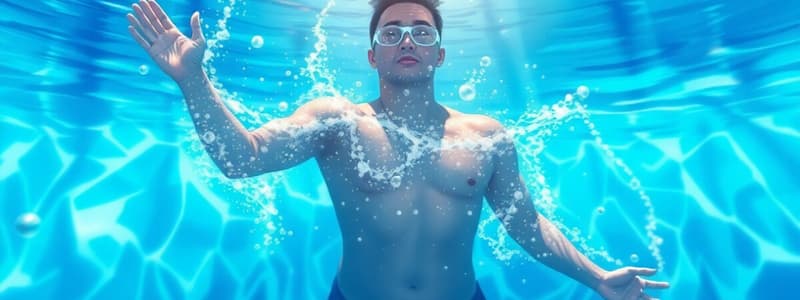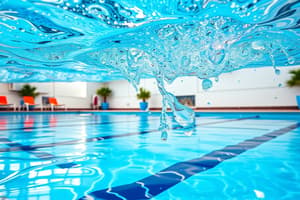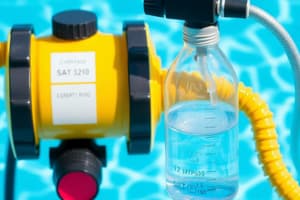Podcast
Questions and Answers
Which method is appropriate for accurately performing a color-matching water test?
Which method is appropriate for accurately performing a color-matching water test?
- Be in a dimly lighted room
- Hold the comparator up to direct sunlight
- Wear sunglasses and hold the comparator up to the sunlight
- Hold the sample up to the northern horizon or a daylight illuminator (correct)
To neutralize hydrochloric acid produced by chlorine gas in pools, which substance should be used?
To neutralize hydrochloric acid produced by chlorine gas in pools, which substance should be used?
- Carbon dioxide
- Caustic soda or soda ash (correct)
- Sodium thiosulfate
- Cyanuric acid
What is the only physical factor that directly affects water balance in a pool?
What is the only physical factor that directly affects water balance in a pool?
- Calcium hardness
- pH
- Total dissolved solids (TDS)
- Temperature (correct)
What is the approximate weight of water in a spa with an 8′ diameter and a water depth of 2′-8″?
What is the approximate weight of water in a spa with an 8′ diameter and a water depth of 2′-8″?
What is the surface area of a round pool with a diameter of 25′?
What is the surface area of a round pool with a diameter of 25′?
Which statement is true regarding accurate color-matching in water testing?
Which statement is true regarding accurate color-matching in water testing?
How does temperature affect water balance in swimming pools?
How does temperature affect water balance in swimming pools?
Which chemical is least effective in neutralizing the acid produced by chlorine gas in pools?
Which chemical is least effective in neutralizing the acid produced by chlorine gas in pools?
What additional requirement must a compound meet to be classified as a disinfectant?
What additional requirement must a compound meet to be classified as a disinfectant?
What is the calculated volume of water in gallons for a round pool with a 20′ diameter and a depth of 5′-4″?
What is the calculated volume of water in gallons for a round pool with a 20′ diameter and a depth of 5′-4″?
Given the water testing parameters of pH 7.2, temperature 103°F, calcium hardness 600 ppm, total alkalinity 120 ppm, and TDS 1,500 ppm, what is the most likely condition of the water?
Given the water testing parameters of pH 7.2, temperature 103°F, calcium hardness 600 ppm, total alkalinity 120 ppm, and TDS 1,500 ppm, what is the most likely condition of the water?
What is the average depth of a rectangular swimming pool measuring 30′ long by 15′ wide with a depth of 3′ on the shallow end and 6′ on the deep end?
What is the average depth of a rectangular swimming pool measuring 30′ long by 15′ wide with a depth of 3′ on the shallow end and 6′ on the deep end?
Which of the following indicates a need for adjustments in water quality to prevent scaling?
Which of the following indicates a need for adjustments in water quality to prevent scaling?
What is the main function of having a measurable residual in disinfection processes?
What is the main function of having a measurable residual in disinfection processes?
Which of the following statements regarding disinfectants is incorrect?
Which of the following statements regarding disinfectants is incorrect?
What range does the total dissolved solids (TDS) need to be monitored for a spa to avoid scale formation?
What range does the total dissolved solids (TDS) need to be monitored for a spa to avoid scale formation?
What is the best position to hold a sample during a color-matching water test for accurate results?
What is the best position to hold a sample during a color-matching water test for accurate results?
Which chemical is most effective in neutralizing hydrochloric acid produced by chlorine gas in swimming pools?
Which chemical is most effective in neutralizing hydrochloric acid produced by chlorine gas in swimming pools?
What physical factor uniquely affects the water balance in a pool?
What physical factor uniquely affects the water balance in a pool?
How much water does a spa with an 8′ diameter and a water depth of 2′-8″ approximately contain?
How much water does a spa with an 8′ diameter and a water depth of 2′-8″ approximately contain?
What is the surface area of a round pool that measures 25′ in diameter?
What is the surface area of a round pool that measures 25′ in diameter?
Which option best describes the impact of temperature on water saturation index in a pool?
Which option best describes the impact of temperature on water saturation index in a pool?
Which of the following is NOT a requirement for accurate color matching in water tests?
Which of the following is NOT a requirement for accurate color matching in water tests?
In water testing, which condition is most likely to require adjustments to maintain water balance?
In water testing, which condition is most likely to require adjustments to maintain water balance?
What is a required characteristic of a compound to be classified as a disinfectant?
What is a required characteristic of a compound to be classified as a disinfectant?
What volume of water is contained in a round pool with a 20' diameter and a depth of 5'4"?
What volume of water is contained in a round pool with a 20' diameter and a depth of 5'4"?
Given the water testing parameters, which condition is most likely for the spa water?
Given the water testing parameters, which condition is most likely for the spa water?
What is the average depth of a rectangular swimming pool measuring 30' long by 15' wide with depths of 3' and 6'?
What is the average depth of a rectangular swimming pool measuring 30' long by 15' wide with depths of 3' and 6'?
What is the total dissolved solids (TDS) level of the spa given the testing parameters?
What is the total dissolved solids (TDS) level of the spa given the testing parameters?
What is the effect of high calcium hardness and TDS in the spa?
What is the effect of high calcium hardness and TDS in the spa?
If a compound does not leave a measurable residual in the water, how might this affect its classification?
If a compound does not leave a measurable residual in the water, how might this affect its classification?
Which of the following is likely true if a spa has a pH of 7.2 and a temperature of 103°F?
Which of the following is likely true if a spa has a pH of 7.2 and a temperature of 103°F?
What additional aspect must a disinfectant achieve aside from killing 99.9% of contaminants?
What additional aspect must a disinfectant achieve aside from killing 99.9% of contaminants?
What lighting conditions should be avoided when using a color comparator for water testing?
What lighting conditions should be avoided when using a color comparator for water testing?
What factor primarily causes the water in a spa with 600 ppm calcium hardness to potentially form scale?
What factor primarily causes the water in a spa with 600 ppm calcium hardness to potentially form scale?
What factor primarily influences the water's saturation index in pools?
What factor primarily influences the water's saturation index in pools?
How many gallons of water does a round pool with a 20′ diameter and a water depth of 5′-4″ approximately contain?
How many gallons of water does a round pool with a 20′ diameter and a water depth of 5′-4″ approximately contain?
Which of the following chemicals is least effective at maintaining a balanced pH when using chlorine gas in pools?
Which of the following chemicals is least effective at maintaining a balanced pH when using chlorine gas in pools?
What is the average depth of a rectangular swimming pool measuring 30′ long by 15′ wide with depths of 3′ and 6′?
What is the average depth of a rectangular swimming pool measuring 30′ long by 15′ wide with depths of 3′ and 6′?
What is the correct approach for calculating the water volume of a round spa?
What is the correct approach for calculating the water volume of a round spa?
In what state is the water if it has a pH of 7.2, temperature of 103°F, calcium hardness of 600 ppm, total alkalinity of 120 ppm, and TDS of 1,500 ppm?
In what state is the water if it has a pH of 7.2, temperature of 103°F, calcium hardness of 600 ppm, total alkalinity of 120 ppm, and TDS of 1,500 ppm?
What condition is indicated if a water treatment process does not leave a measurable residual?
What condition is indicated if a water treatment process does not leave a measurable residual?
In which situation could the use of hydrochloric acid in swimming pools lead to complications?
In which situation could the use of hydrochloric acid in swimming pools lead to complications?
To which classification would a compound be assigned if it leaves a measurable residual in the water?
To which classification would a compound be assigned if it leaves a measurable residual in the water?
What method involves the best practice for color-matching water tests?
What method involves the best practice for color-matching water tests?
What is a significant consequence of high total dissolved solids (TDS) levels in spa water?
What is a significant consequence of high total dissolved solids (TDS) levels in spa water?
What could potentially occur if the temperature of pool water is not properly monitored?
What could potentially occur if the temperature of pool water is not properly monitored?
Which characteristic must a substance possess to be an effective neutralizer of acids in pool water?
Which characteristic must a substance possess to be an effective neutralizer of acids in pool water?
Study Notes
Color-Matching Water Test
- For accurate color comparison, hold the sample up to the northern horizon or a daylight illuminator.
- This provides consistent lighting conditions, minimizing glare and variations in lighting.
Pool Water Chemistry
- Chlorine gas disinfectant can produce hydrochloric acid.
- To neutralize the acid, use caustic soda or soda ash.
- These substances help maintain the pH balance of the pool water.
Water Balance
- Temperature is the only physical factor that directly impacts water balance.
- Temperature influences the saturation index, which measures the water's tendency to deposit or dissolve calcium carbonate.
- As temperature increases, the saturation index decreases, potentially leading to scaling or corrosive water conditions.
Pool Volume Calculations
- A spa with an 8′ diameter and 2′-8″ depth contains 8,370.39 pounds of water.
- A round pool with a 25′ diameter has 490.63 square feet of surface area.
- A round pool with a 20′ diameter and a 5′-4″ depth holds between 12,501 and 12,600 gallons of water.
- A rectangular pool measuring 30′ long by 15′ wide with a 3′ shallow end and 6′ deep end holds between 15,101 and 15,200 gallons of water.
Disinfectants
- To be classified as a disinfectant, a compound must kill or inactivate 99.9% of contaminants.
- It must also leave a measurable residual in the water to ensure ongoing protection against microbial growth.
Spa Water Balance
- A spa with a pH of 7.2, 103°F temperature, 600 ppm calcium hardness, 120 ppm total alkalinity, and 1,500 ppm TDS is likely to be scale forming.
- This is because the high calcium hardness and TDS levels indicate a potential for scale formation, especially at a high temperature.
Color Matching Water Test
- When performing a color-matching water test using a comparator, hold the sample up to the northern horizon or a daylight illuminator.
- This provides consistent light conditions for accurate color comparison between the sample and standard color discs.
- It minimizes glare and lighting variations for precise color matching.
Chlorine Gas Disinfectant
- Pools using chlorine gas produce hydrochloric acid that can be neutralized using caustic soda or soda ash.
- Caustic soda and soda ash help maintain the pH balance of pool water, ensuring it remains safe for swimmers.
Water Balance Factors
- Temperature is the only physical factor that affects water balance.
- Water temperature influences the saturation index, which measures the water's tendency to deposit or dissolve calcium carbonate.
- Increasing temperature decreases the saturation index, potentially leading to scaling or corrosive water conditions.
- Adjustments to pH, TDS, and calcium hardness may be required to maintain water balance with temperature changes.
Pool Volume Calculations
- A spa with an 8-foot diameter and a 2.67-foot depth will contain approximately 8,307.49 pounds of water.
- A round pool with a 25-foot diameter contains 490.63 square feet of surface area..
- A round pool with a 20-foot diameter and a 5.33-foot depth contains approximately 12,552.15 gallons of water.
Disinfectant Properties
- To be classified as a disinfectant, a compound must kill or inactivate 99.9% of contaminants and leave a measurable residual in the water.
- The residual ensures ongoing protection against microbial growth and contamination between treatments.
Evaluating Spa Water Balance
- A spa with a pH of 7.2, a temperature of 103°F, calcium hardness of 600 ppm, total alkalinity of 120 ppm, and TDS of 1,500 ppm is likely to be scale forming.
- High calcium hardness and TDS levels, combined with high temperatures, indicate a potential for scale formation.
- Adjusting calcium hardness and the TDS levels may be necessary to prevent scaling issues.
Rectangular Swimming Pool Volume Calculation
- A rectangular swimming pool measuring 30 feet long by 15 feet wide with a 3-foot shallow end and a 6-foot deep end contains approximately 15,150 gallons of water.
Water Testing Procedures
- To ensure accurate color comparisons during a water test using a comparator, use either the northern horizon or a daylight illuminator for consistent lighting.
- Avoid direct sunlight or dimly lit rooms as they can affect the color readings.
Pool Water Chemistry
- Chlorine gas used as a disinfectant in pools can lead to hydrochloric acid formation.
- Neutralize this acid by using caustic soda or soda ash to maintain the pool's pH balance.
Water Balance Factors
- Although multiple factors can affect water balance, temperature is the sole physical factor influencing it.
- Temperature directly affects the saturation index, indicating water's tendency to dissolve or deposit calcium carbonate.
- As temperature rises, the saturation index may lower, potentially leading to scaling or corrosive water conditions.
Pool Water Volume Calculation
-
To calculate the volume of water in a round pool:
- Multiply the radius by itself times the depth and 3.14.
- Multiply the result by 62.4 for pounds or 7.50 for gallons.
-
For a rectangular pool:
- Calculate the average depth by adding the shallow and deep ends and dividing by two.
- Multiply the average depth by the length and width.
- Multiply the result by 62.4 for pounds or 7.50 for gallons.
Disinfectant Characteristics
- Disinfectants should kill 99.9% of contaminants and leave a measurable residual in the water for ongoing protection.
- This residual ensures continued protection against microbial growth between treatments.
Spa Water Balance
- A spa with a pH of 7.2, temperature of 103°F, calcium hardness of 600 ppm, total alkalinity of 120 ppm, and TDS of 1,500 is likely to be scale forming.
- The high calcium hardness and TDS values, especially in a hot environment, increase the risk of scale formation.
- Adjustments to reduce calcium hardness and TDS might be necessary to prevent scaling.
Studying That Suits You
Use AI to generate personalized quizzes and flashcards to suit your learning preferences.
Related Documents
Description
This quiz covers essential topics on pool water chemistry, including color-matching techniques, chemical balance, and volume calculations. Learn how temperature impacts water balance and the methods for neutralizing acid. Perfect for pool maintenance enthusiasts and professionals.




